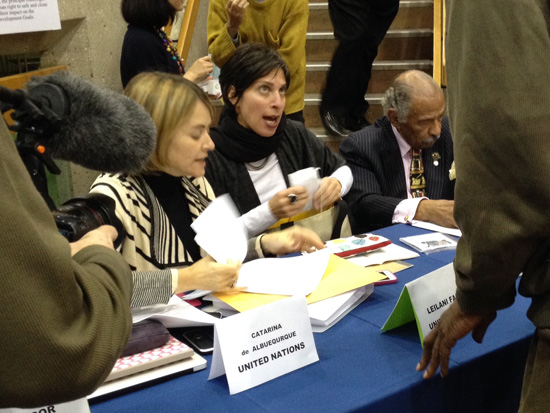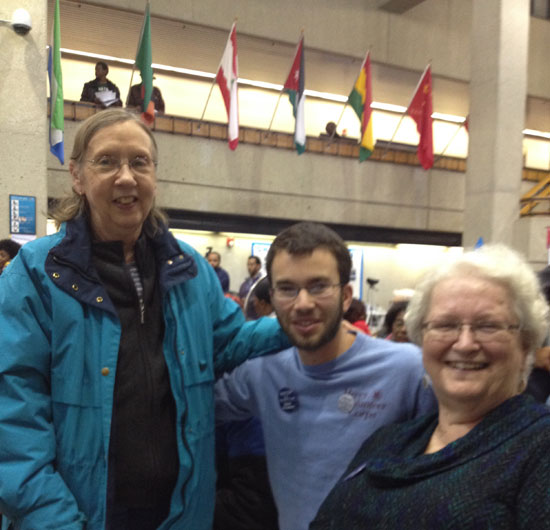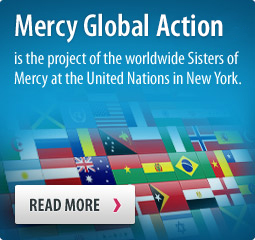
Sisters of Mercy of the Americas follow the Human Right to Water at the Local Level
Reports: October 29, 2014
On 19 October, two Special Rapporteurs (see below for a description) from the United Nations held a Fact-Finding Town Hall Meeting in Detroit, Michigan, USA, regarding potential human rights violations related to water shut offs.
Catarina de Albuquerque, Special Rapporteur on the Human Right to Safe Drinking Water and Sanitation, and Leilani Farha, Special Rapporteur on Adequate Housing, came at the invitation of the Detroit Peoples Water Board Coalition to hear the stories of families and senior citizens living without water as a result of unaffordable and incorrect water bills.

UN Rapporteurs Catarina de Albuquerque and Leilani Fahra interact with Detroiters regarding water shutoffs
The Detroit Peoples Water Board Coalition (DPWB) is a grassroots organization whose goals are to provide water to people in need, to stop shutoffs and restore water to households, to implement a plan for affordable water for all, and to prevent privatization. Members of the Sisters of Mercy of the Americas West Midwest Community, Mary Ellen Howard and Canice Johnson, and Mercy Volunteer Corps member, Rich Samartino, are active members of the Detroit Peoples Water Board Coalition.
In May, Maude Barlow, founder of The Blue Planet Project, and chair of Food & Water Watch, came to Detroit to consult with the DPWB. Subsequently, Ms. Barlow submitted a report to the UN entitled “Regarding Water Cut-offs in the City of Detroit Michigan.” UN Rapporteurs responded to say that “Disconnections of water services because of failure to pay due to lack of means constitutes a violation of the human right to water and other international human rights. Disconnections due to non-payment are only permissible if it can be shown that the resident is able to pay but is not paying. In other words, when there is genuine inability to pay, human rights simply forbids disconnection.” To the members of the DPWB coalition, it was obvious that the human right to water was being violated in Detroit.
How is it that the human right to water is being denied to poor people in the richest country in the world, and in a state surrounded by the Great Lakes which hold 21% of the world’s fresh water?
Detroit is a city whose population and economy has been in decline for decades. Because of high unemployment and high poverty, a majority of the black population does not have income adequate to meet their basic needs, including paying for water. When an Emergency Manager was appointed to take over the city and declare bankruptcy, water shutoffs escalated. In April of 2014, the EM, planning to privatize the city’s water department, ordered the water cut off to 50,000 households that were behind in paying their water bills.
Although water is essential to life and health, the city continues to shut off water to 700 households per week. Without water, families cannot bathe, do laundry, wash fruits and vegetables, flush toilets or clean their houses. Citizens who gave testimony at the UN Town Hall Meeting accused the city of genocide and told stories of:
- School principals opening schools at 5am, so that children could shower and wash their clothes in gymnasium locker rooms,
- Children removed by Protective Services from their homes and because there is no water in the home.
- Residents allowing their neighbors without water to use the tap at the side of their house, only to see their water bills rise $600/mo.
- Residents who paid their bills having their water turned off anyway.
- The incompetency and cruelty of water department representatives.
- The balance of water bills being transferred to the resident’s property tax bill, so that they are in jeopardy of losing their home.
- Being held responsible for bills from former tenants
- Being forced out of their homes and into homeless shelters, due to lack of water
- Poverty has become a crime; we are being punished for being poor.
- No action by Detroit Water and Sewerage Department (DWSD) when water is running into the street from abandoned houses, so that millions of gallons are wasted.
In addition to the Fact-Finding Town Hall Meeting, the UN Rapporteurs’ 3-day visit included meetings with the coalition’s legal team and with labor unions involved in the Water Department. They took a bus tour of the city, stopping at homes where the water was shut off, to meet with the residents. At the end of the visit, they shared their findings at a press conference and with the Mayor. To the attendees of the Town Hall meeting the rapporteurs pledged that they will “put pressure on federal, state and local officials to resolve the problem—and will continue to help Detroiters with water and housing needs.”
Messages to: Mary Ellen Howard rsm - Public Policy Advocate

Karen Donahue rsm, Rich Samartino of Mercy Volunteer Corps, and Mary Ellen Howard rsm participate in the Town Hall Meeting
Read the Joint Press Statement by Special Rapporteur on adequate housing as a component of the right to an adequate standard of living and to right to non-discrimination in this context, and Special Rapporteur on the human right to safe drinking water and sanitation Visit to city of Detroit (United States of America) 18-20 October 2014 - See more here
The Office of the High Commissioner on Human Rights (OHCHR): A Special Rapporteur is an independent expert appointed by the Human Rights Council to examine and report back on a country situation or a specific human rights theme. This position is honorary and the expert is not United Nations staff nor paid for his/her work. The Special Rapporteurs are part of the Special Procedures of the Human Rights Council
The mandate of the Special Rapporteur on the human right to safe drinking water and sanitation
Having access to safe drinking water and sanitation is central to living a life in dignity and upholding human rights. Yet billions of people still do not enjoy these fundamental rights.
The rights to water and sanitation require that these are available, accessible, safe, acceptable and affordable for all without discrimination. These elements are clearly interrelated. While access to water may be guaranteed in theory, in reality, if it is too expensive, people do not have access. Women will not use sanitation facilities which are not maintained or are not sex segregated. Having a tap which delivers unsafe water does not improve one’s access. Human rights demand a holistic understanding of access to water and sanitation.
The rights to water and sanitation further require an explicit focus on the most disadvantaged and marginalized, as well as an emphasis on participation, empowerment, accountability and transparency. The mandate of the Special Rapporteur on the human right to safe drinking water and sanitation was established to examine these crucial issues and provide recommendations to Governments, to the United Nations and other stakeholders. Ms. Catarina de Albuquerque was appointed in September 2008, and began her work on the mandate in November 2008. Read more here
The Mandate of the Special Rapporteur on adequate housing as a component of the right to an adequate standard of living and to right to non-discrimination
As defined by the first Special Rapporteur, “the human right to adequate housing is the right of every woman, man, youth and child to gain and sustain a safe and secure home and community in which to live in peace and dignity”.
This definition is in line with the core elements of the right to adequate housing as defined by General Comment No. 4 of the United Nations Committee on Economic, Social and Cultural Rights (the body in charge of monitoring the implementation of the International Covenant on Economic, Social and Cultural Rights in the States which are party to it). According to the Committee, while adequacy is determined in part by social, economic, cultural, climatic, ecological and other factors, it is nevertheless possible to identify certain aspects of the right that must be taken into account for this purpose in any particular context. They include the following: a) Legal security of tenure; b) Availability of services, materials, facilities and infrastructure; c) Affordability; d) Habitability; e) Accessibility; f) Location; and g) Cultural adequacy. For the definition of theses elements, please refer to General Comment No. 4. For more on the human right to adequate housing, please refer to International Standards.
To read more on the mandate, please refer here




